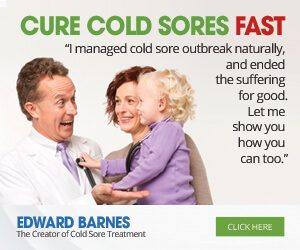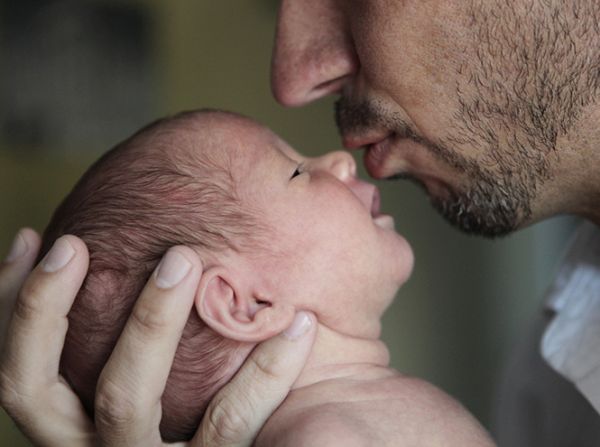
Cold sores in toddlers – Accidentally kissed baby with cold sore! ?
Are you worried about your toddler’s health? Have you noticed tiny red blisters in the mouth, nose or any other face’s part of the toddler? Then, it could be a cold sore!
Cold sores are the tiny red coloured blisters that contain fluid. They grow in and around the area surrounding the lips. These blisters get triggered by the herpes simplex virus (HSV-1). The cold sores might exist in the interiors of the soft nerve tissues.
Toddlers cry so much as it is very painful for them. But you don’t need to panic as you have landed on the right page already!
The article below will share some useful info about the cold sores and herpes simplex virus and the best way to cure it effectively without any side effects afterwards for your toddlers.
So, let’s begin!
What are Cold Sores in Toddlers?
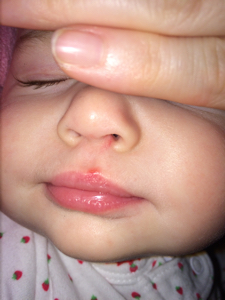
As mentioned earlier, cold sores are the tiny red blisters filled with fluid. They can occur in single blister or in clusters. Regardless of its name, cold sore does not have any link to the normal cold.
Cold sores occur in infants or toddlers in rare cases. However, the sheer size and the incidence of cold sores in toddlers is rising sharply. More alarmingly, the prevalence among children has increased over the past 10 years. The question that arises here is why do toddlers get cold sores?
Causes of the Cold Sores in Toddlers
The following are the common causes of cold sores in infants:
- Herpes simplex virus (HSV) Type 1 and II
- By sharing feeding cups, toys or bowls used by the person infected with cold sores.
- Mothers infected with genital herpes delivering the baby through the vaginal birth can transfer the virus to her child.
- Infected person kissing a toddler or an infant.
Symptoms of the Cold Sore Virus in Toddlers
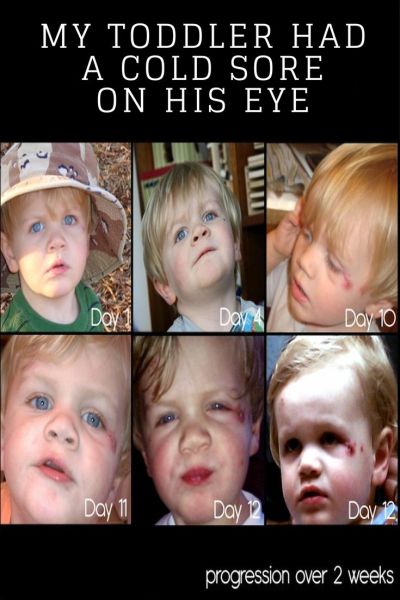
The symptoms of the cold sore in toddler might vary from kid to kid. That’s the reason, why we have separately prepared the list of the initial signs and secondary symptoms so that you can easily keep an eye on your infant and identify the infection blisters instantly.
1. Primary Symptoms:
During the initial period (first attack of the infection), your toddler might experience the following symptoms. It could be so mild that you may not identify these warning signs.
- Swelling of the gums
- Pain in the mouth
- A sore throat
- High Body Temperature
- Inflammation in the nodes of lymph
2. Secondary Symptoms:
During the second phase, the infant might not possess any of the above primary symptoms excluding blister close to the lips. However, the infant may experience the following symptoms or signs and symptoms:
- Separate eruptions of blisters
- Fever
- Anxiety
But, it’s the fact that a toddler cannot convey his or her feelings. That is why as a parent, you have to observe the cold sore signs and symptoms at an initial phase.
When Are Cold Sores Considered Dangerous?
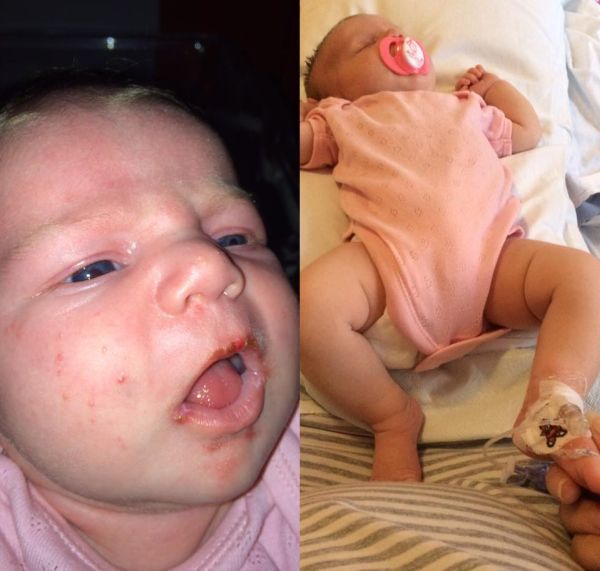
Among the toddlers, it is an exception that they get infected from the cold sores in their first six months age. The undeniable fact – breastfeeding boosts the baby’s immune system. The American Academy of Pediatrics has long known that and thus recommending that babies be breastfed exclusively for 6 months.
The cold sores in the infants are dangerous in the following circumstances:
- If the infant finds it hard to drink fluids and is not hydrated well then there is an urgent need for medical assistance.
- If the cold sore infected infant touches the eyes, then it can lead to the eye infection recognized as ocular herpes.
- The toddlers who get the cold sores in the initial first three months may need to see a doctor as this infection can rapidly spread from its original area to other parts of the body. Very rare, it’s devastating when the cold sore virus strikes the brain. It could lead to meningitis or encephalitis, and possibly death.
- The infant having a cold sore inside the eyelid must get prompt medical assistance. If left untreated, it can cause scarring of the cornea and a permanently blurred vision.
How to Prevent the Cold Sores in Toddlers?
The highly contagious herpes simplex virus that causes cold sores in the babies is quite infectious, and therefore you have to take suitable actions to stop the infection from spreading. Medical professionals advocate special procedures to prevent your loved ones from getting cold sores.
Best practices for preventing and spread of cold sores in toddlers include the following:
- You should try to keep your loved one away from cold sore infected babies or persons in the family.
- Try to avoid the exposure of the infant towards too much sunlight as it might trigger the occurrence.
- Always disinfect the bottles and utensils of the babies, which he or she uses.
- During the period of cold sores, kids don’t like having too much food. Thus, you can breastfeed your baby more at this time.
- Make your baby hydrated with the more water. Let him use a straw if his mouth is sore to handle any drink.
- There must be separate flannels and towels for the babies, which other people do not use.
- If somehow infant touches the cold sores then, immediately wash their hands to avoid the infection from spreading to other parts of the body.
- Make your infant engaged in something so that they do not touch their eyes as the eye’s HSV infections could be very harmful.
- You should also wash your hands recurrently if you are taking care of the infectious baby.
- It does not matter that if you have genital herpes as it cannot transfer at the time of breastfeeding.
- Do not let any person kiss your toddler who is already suffering from the cold sores as the herpes simplex virus gets transmitted easily during kissing. Instead, you can ask to tickle and touch your toddler’s feet.
- Keep the toys and utensils of your toddler separate.
- Apply a wet towel or an ice pack over the infected region to help your toddler feel better. It eases the inflammation and redness owing to cold sores.
- Don’t give any acidic foods or citric fruit juices such as lemon, tomatoes, oranges, etc. to the baby.
Effective Treatment to Cure Cold Sores in Babies
Detecting the symptoms of the cold sore in the babies is quite a difficult thing to do. But, if you have a concern about their health then, it’s better to be alert.
The doctor generally suggests the topical cream for applying on the sores, and it might take 8 to 10 days for getting the cure. Some doctors also recommend giving ibuprofen and paracetamol for easing the pain and discomfort in the kids.
A herpes infection is more serious for newborn babies and toddlers than for an adult. Do you think, exposing an infant’s sensitive skin and body parts to harmful chemicals and drugs is the proper cure to treat the cold sores?
Well! I also agree that the infants should get treated with the natural therapy that does not have any side effects. Moreover, the results are also long-term. The cold sore virus is recurrent, and it can emerge again after a few months.
But we have an easy solution for you!
With the patented technology of the world-famous Dr Edward Barnes, you can cure this problem of its root easily and quickly. With his Guaranteed and Natural Treatment, you can say goodbye to the cold sores in your infants and let them enjoy their childhood with full pleasure. We can assure you an outstanding results and rewards later.



